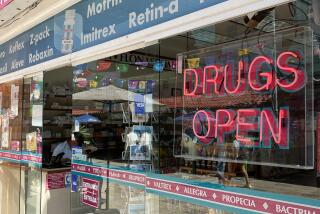Patients at Clinics in Orange, La Palma Get Mislabeled Drug
- Share via
Patients at two privately run Orange County clinics were given drugs that had been mislabeled, a potentially fatal mix-up that sent one patient to a hospital in a coma earlier this week, state health officials said Thursday.
State officials identified the clinics as the AmeriCare 1 centers in Orange and La Palma. Investigators were combing clinic records Thursday night, and a spokesman said that all but six of the improperly labeled prescriptions have been recovered. The state Department of Health Services in Sacramento issued a warning to patients of the clinics to check their prescription labels carefully.
According to state officials, the patients were given boxes of pills labeled “metronidazole 250 mg,” a drug most frequently used by women to treat vaginal yeast infections.
Instead, the vials contained tolazamide, an anti-diabetic drug that can cause low blood sugar, coma and death when taken in dosages recommended for the anti-infection drug, officials said.
Officials said the mistake was discovered when a woman was admitted in a coma to a hospital in Artesia, and the cause was traced to her medication. Health officials did not identify the hospital or the woman but said she is recovering.
Investigators discovered that about 1,000 of the scored, white tablets had been mislabeled by their packager, identified by state officials as Medical Mart-Med Pak of Costa Mesa.
Michael O’Neil, president of U.S. Medical Enterprises of El Segundo, which owns the AmeriCare 1 chain, identified the drug supplier as Med-Pak Pharmaceuticals of Costa Mesa.
According to state officials, the firm has moved to a Huntington Beach address--an office located near retirement apartments in a mainly residential district. They said they have contacted the firm and are going to search the firm’s records.
Stuart Richardson, chief of the food and drug branch of the state Department of Health Services, declined to say whether the packaging firm or the clinics are in danger of prosecution for the error. “We’re trying to find out where it happened, at what stage, who did it,” he said.
O’Neil said his firm received the drug from Med-Pak already packaged in sealed boxes and labeled by computer. “Obviously we’re quite distressed, but as in the Tylenol situation, we’re in the same position as the markets that purchased the Tylenol tablets. . . . We’re simply one of Med-Pak’s customers,” O’Neil said.
(In 1982, seven people in the Chicago area died after buying Tylenol capsules that had been laced with cyanide.)
“Since this medication is provided to us in sealed containers, we have no way of determining the actual content of the package,” O’Neil said. “. . . We rely on the accuracy of the label.”
According to Dr. Kenneth W. Kizer, state health services director, the tablets are dispensed in amber-colored boxes, 2 1/2 inches by 1 1/2 inches by 1/2 inch. The lot number on those boxes is 2979707, with the expiration dates of 5-86 or 6-86. The pills are stamped with the code Z2979.
He urged patients who obtained prescriptions labeled “metronidazole 250 mg” from the two clinics to contact their physicians and check the labels carefully before taking the drug.
Richardson said the mislabeled boxes were sent to two other locations--a clinic and a doctor’s office in Orange County--but that they were recovered there without difficulty. He said he did not have the name of the clinic and doctor.
“Either they had not been given to patients or we knew who they’d been given to. There have been no other reports of illness to us or to any poison control center,” Richardson said.
More to Read
Sign up for Essential California
The most important California stories and recommendations in your inbox every morning.
You may occasionally receive promotional content from the Los Angeles Times.













